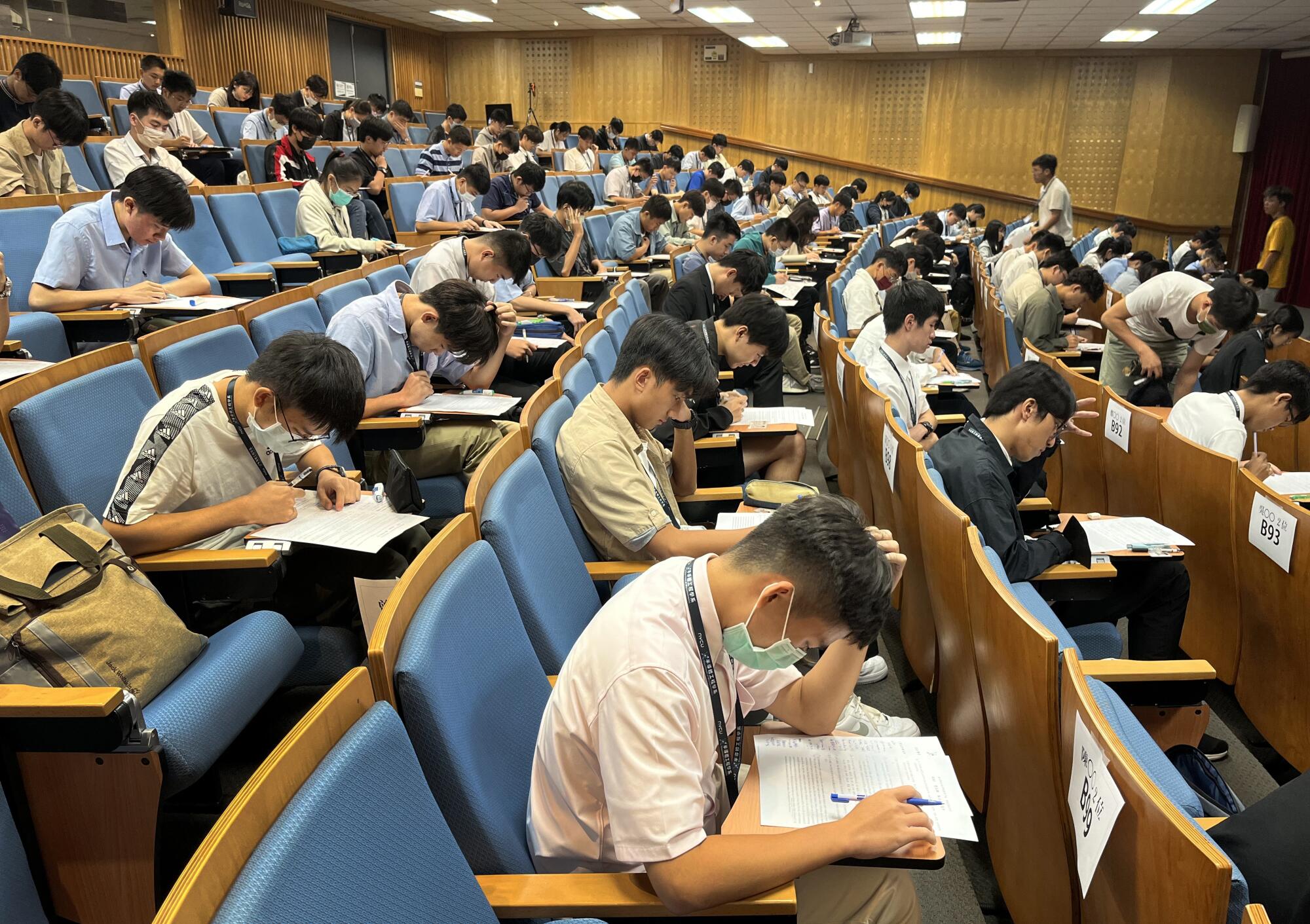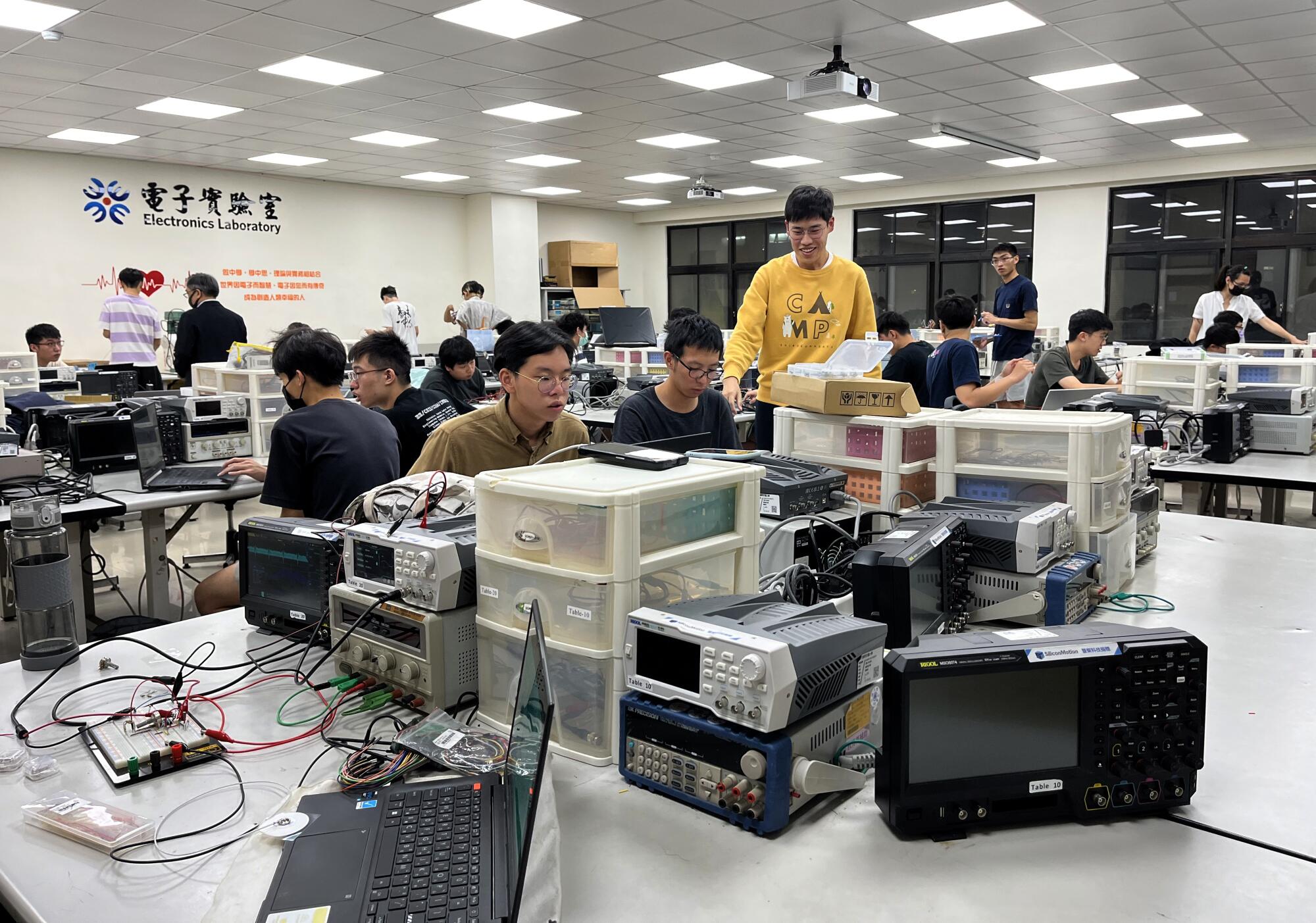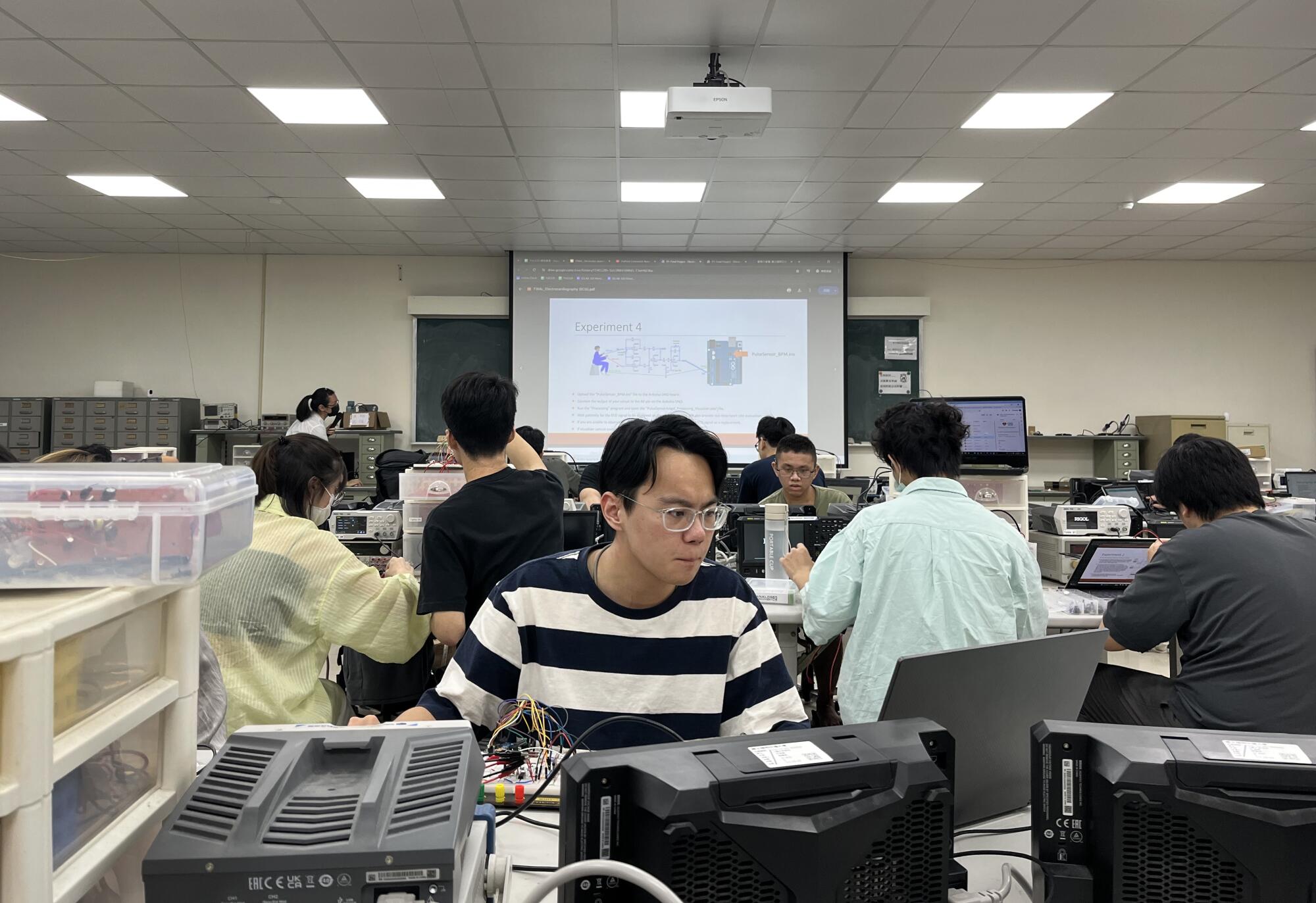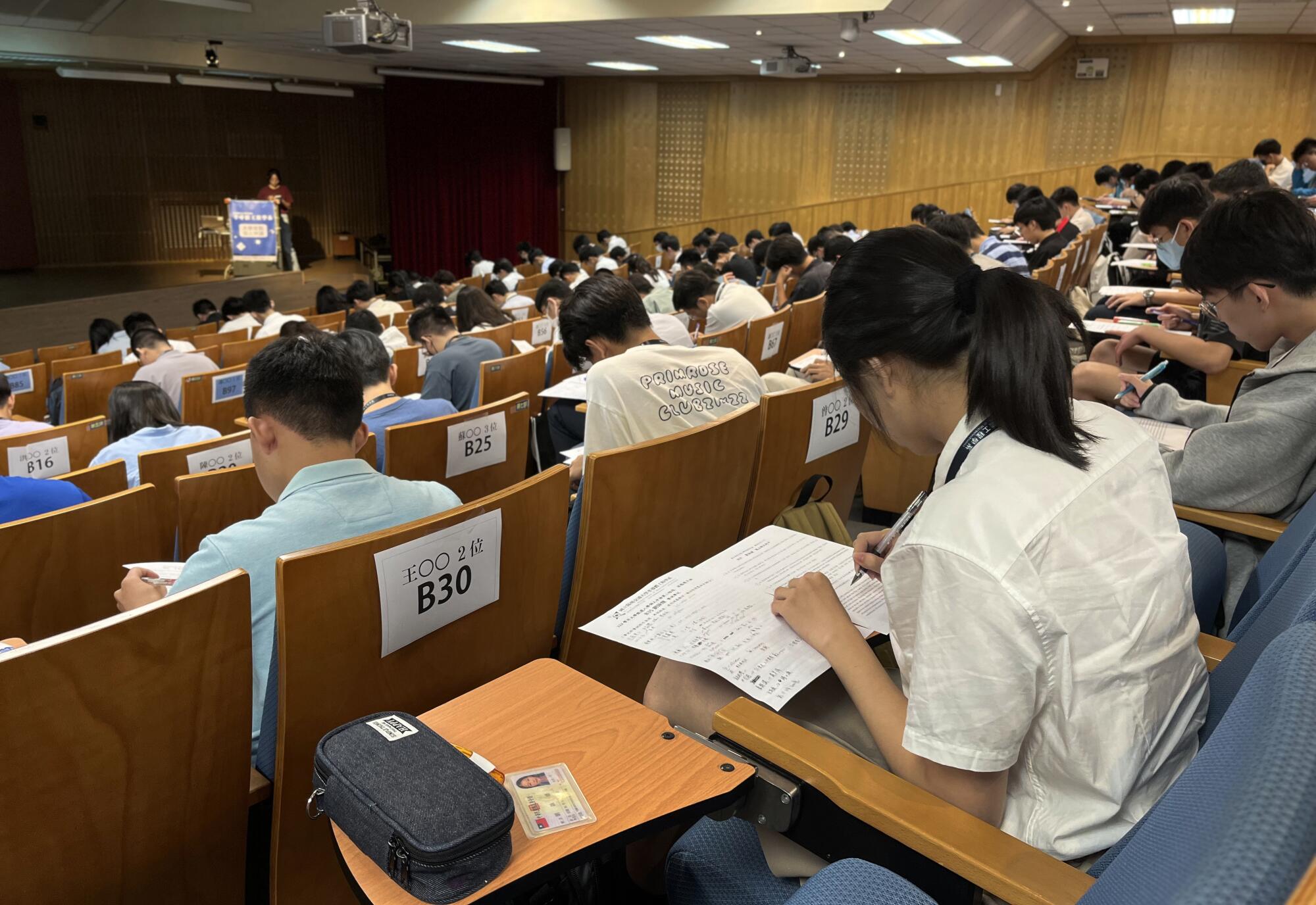
Build the technology of the future. Protect the nation from attack. Buy a sports car.
These were some of the benefits of working in the semiconductor industry, as 200 high school students recently learned during a daylong recruitment event for one of Taiwan's top engineering schools.
“Taiwan does not have many natural resources,” Morris Ker, chairman of the newly established department of microelectronics at National Yang Ming Chiao Tung University, told the students. “You are Taiwan's high-end 'brain mine'. You should not waste the information you have been given.”
The island of 23 million produces nearly a fifth of the world's semiconductors, microchips that power virtually everything: home appliances, cars, smartphones and more. In addition, Taiwan specializes in the smallest, most advanced processors, accounting for 69% of global production in 2022, according to the Semiconductor Industry Assn. and the Boston Consulting Group.
But a pandemic-induced chip shortage, along with rising geopolitical tensions in Asia, have highlighted the fragility of the current supply chain – and its island dependency under the specter of a Chinese takeover.
In the US, Japan, South Korea, Taiwan and China, the semiconductor industry is already short of hundreds of thousands of workers. In 2022, consultancy and financial services firm Deloitte estimated that semiconductor companies would need more than 1 million additional skilled workers by 2030.
Morris Ker, chair of NYCU's microelectronics department, gives a presentation on why students should join the semiconductor industry.
(Stephanie Yang/Los Angeles Times)
In an effort to maintain Taiwan's status as the chip-making capital of the world, the government and several companies here helped the university – known as NYCU – establish the microelectronics department last year to fast-track students into jobs in the lead industry. Now the department was recruiting its first class.
Twenty-year-old Wu Min-han, who sat in the front row with his mother, didn't need much convincing.
He initially applied to major in mathematics, but dropped out after losing interest in the subject. Then he read about the new microelectronics program and decided to apply. He's waiting to hear it.
“This department could have a quite positive impact on my future career prospects,” he said.
Others were torn.
Lian Yu-yan, 18, said that while the new department seems impressive, she is also interested in majoring in mechanical engineering and photonics. She hopes to find a well-paying tech job after graduation, but wants to keep her options open.

Prospective students for a new microelectronics department at NYCU take an entrance exam.
(Xin-yun Wu / For The Times)
Her father, who accompanied her to the event, has worked in the semiconductor industry and sees great growth potential in the evolution of AI. However, that didn't do much to convince his daughter.
“You can't control Gen Z,” he said with a laugh and a shrug.
Many prospective students competing for the 65 spots in next semester's program cited salary and job stability as their top considerations. In Taiwan, there are few industries that can compete with semiconductors in terms of pay and prestige.
As the rise of electric vehicles, artificial intelligence and other advanced technologies increasingly require semiconductors, many countries are making chip self-sufficiency a top priority.
In the U.S., Europe and Asia, governments have announced more than $316 billion in tax breaks for the semiconductor industry since 2021, according to Semiconductor Industry Assn. and the Boston Consulting Group.
A May report from these organizations predicted that private companies will spend another $2.3 trillion through 2032 to build more semiconductor production facilities, known as fabrication plants or factories.

NYCU students work on building ECG heart monitors in the lab Thursday evening.
(Stephanie Yang/Los Angeles Times)
Meanwhile, expanding chip-making capabilities is exacerbating another shortage: of the people trained to make them.
As the global war for talent intensifies and Taiwan loses market share in the manufacturing sector, the island has even more incentives to train its next generation of workers.
Known as Taiwan's “silicon shield,” the semiconductor industry is considered so crucial to the global economy that it could deter Beijing, which claims island democracy, from launching a military attack. Taiwanese often call Taiwan Semiconductor Manufacturing Company, the world's largest chipmaker and a major Apple supplier, the “sacred mountain that protects the nation.”
In his presentation, Ker gave another example of the indispensability of the industry. When Taiwan's worst earthquake in a quarter century struck in April, factory workers were evacuated but quickly returned — a sign, Ker said, of the manufacturing hub's resilience.
But for Su

Su Xin-zheng, a second-year student, is working on his final project in the electronics engineering laboratory.
(Xin-yun Wu / For The Times)
“People are always available,” said Su, who added that he would prioritize free time over a big salary. “We saw them all go back inside to protect the machines.”
Industry veterans evoke brutal hours and sacrifices as they describe how Taiwan built its semiconductor industry from the ground up. With black humor they speak, metaphorically, about ruining their liver by working all night.
They fear that the younger generation is less inclined to such criminal work.
In particular, the increasing emphasis on work-life balance is undermining interest in jobs in the manufacturing plants that Taiwan and TSMC are known for.
According to local recruitment platform 104 Job Bank, demand for manufacturing workers has outpaced other parts of the chipmaking process over the past two years, such as designing circuit boards or packaging them after they're made. Engineering students at NYCU said such jobs seemed exhausting, with lower wages than research or design positions.
Ting Cheng-wei, 23, visits anonymous online forums to learn about salaries and job descriptions at different companies. For example, he knows that production jobs, which require full body suits to prevent contamination and twelve-hour shifts in two-day rotations, do not appeal to him.

Students attend a recruitment event for a program designed to train the next generation of semiconductor workers.
(Xin-yun Wu / For The Times)
“Working in the factory is similar to working as a laborer,” says Ting, a master's student and teaching assistant at the university. “Why would I work at a factory when I can be in an office with a higher salary?”
He speculated that the job shortage at semiconductor factories could be solved by simply offering more money.
That would be enough for 19-year-old Wei Yu-han, who was ambivalent about semiconductors after her first year of mechanical engineering. After visiting a factory on a school trip, she found the work easy and well-paid.
“I probably just brainwashed myself into liking it,” she said. “I can give up my freedom for money.”
At the end of the introductory seminar, all students in attendance took a short entrance exam as part of their application. However, the number of registrations in the new department is limited due to new pressure on the workforce. Ker added that the school is also desperate for more semiconductor teachers.
Special Correspondent Xin-yun Wu in Taipei contributed to this report.











